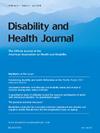导航一个隐藏的残疾:生活经验和成人早期遗传性视网膜疾病的挑战。
IF 3.7
2区 医学
Q1 HEALTH CARE SCIENCES & SERVICES
引用次数: 0
摘要
背景:遗传性视网膜疾病(IRDs)是一种遗传性疾病,通常会导致工作年龄成人视力丧失,是一种独特的隐性残疾,其特点是进展速度不同。目的:本定性研究探讨了成人在视网膜病变早期的生活经历,当时视力丧失并不明显。方法:采用半结构化访谈法,对15例近10年有进行性视力丧失经历的IRD患者(平均年龄37±17岁)进行访谈,探讨其诊断为IRD后的经历和挑战。访谈内容逐字记录,并采用专题分析方法进行分析。结果:分析产生了五个总体主题:1)适应诊断:“旅程可能比实际疾病更难”,描述了接受诊断的挑战。2)日常障碍:“接受我所拥有的,适应我所能适应的”,描述生活方式和行为的改变,以适应不断变化的愿景。3)情绪过山车:“我觉得我无法控制这段旅程”,突出了应对一种可变的、进行性疾病的不确定性所带来的情绪挑战。4)驾驭社会:“它是看不见的,所以人们会忘记”,捕捉来自隐藏残疾的人际挑战。5)前路:在不确定性中寻找身份,描述与身份和未来的斗争。结论:除了视力障碍外,由于残疾的隐藏性,ird患者还面临许多个人和人际挑战。这些挑战并不总是立即显现出来,这突出了提高认识以协助开发有针对性的资源、诊断支持和更广泛的社会对隐性残疾的理解的重要性。本文章由计算机程序翻译,如有差异,请以英文原文为准。
Navigating a hidden disability: Lived experiences and challenges of adults with early stage inherited retinal diseases
Background
Inherited retinal diseases (IRDs) are genetic conditions that typically cause vision loss in working-age adults, representing a unique hidden disability characterised by variable progression rates.
Objective
This qualitative study explored the lived experiences of adults in the early stages of IRDs, when vision loss is not outwardly apparent.
Methods
Semi-structured interviews were conducted with 15 individuals with IRDs (mean age 37 ± 17 years) with experiences of progressive vision loss in the last 10 years, exploring participants’ experiences and challenges following their IRD diagnosis. Interviews were transcribed verbatim and analysed using thematic analysis method.
Results
Analysis yielded five overarching themes: 1) Adapting to the diagnosis: “The journey can be harder than the actual disease”, describing challenges in coming to terms with the diagnosis. 2) Daily obstacles: “Accepting what I have, adapting where I can”, describing lifestyle and behavioural changes to accommodate for changing vision. 3) A roller-coaster of emotions: “I feel like I'm not in control of the journey”, highlighting emotional challenges managing the uncertainty of a variable, progressive disease. 4) Navigating society: “it's invisible, so people forget”, capturing interpersonal challenges stemming from a hidden disability. 5) The road ahead: Finding an identity within uncertainty, describing struggles with identity and the future.
Conclusion
Beyond vision impairment, individuals with IRDs face numerous personal and interpersonal challenges due to the hidden nature of their disability. These challenges are not always immediately apparent, highlighting the importance of raising awareness to assist in developing targeted resources, diagnostic support, and broader societal understanding for hidden disabilities.
求助全文
通过发布文献求助,成功后即可免费获取论文全文。
去求助
来源期刊

Disability and Health Journal
HEALTH CARE SCIENCES & SERVICES-PUBLIC, ENVIRONMENTAL & OCCUPATIONAL HEALTH
CiteScore
7.50
自引率
6.70%
发文量
134
审稿时长
34 days
期刊介绍:
Disability and Health Journal is a scientific, scholarly, and multidisciplinary journal for reporting original contributions that advance knowledge in disability and health. Topics may be related to global health, quality of life, and specific health conditions as they relate to disability. Such contributions include:
• Reports of empirical research on the characteristics of persons with disabilities, environment, health outcomes, and determinants of health
• Reports of empirical research on the Systematic or other evidence-based reviews and tightly conceived theoretical interpretations of research literature
• Reports of empirical research on the Evaluative research on new interventions, technologies, and programs
• Reports of empirical research on the Reports on issues or policies affecting the health and/or quality of life for persons with disabilities, using a scientific base.
 求助内容:
求助内容: 应助结果提醒方式:
应助结果提醒方式:


